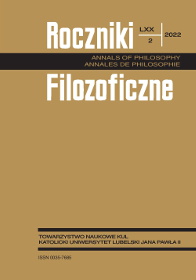Ekologia integralna i antropocentryzm — personalizm ekologiczny Johna Milbanka
Abstrakt
Artykuł omawia ekologiczny wymiar myśli Johna Milbanka w kontekście narastającego kryzysu klimatycznego. W tym celu, koncepcja ekologii integralnej poddana zostaje interpretacji w duchu Milbankowskiego integralizmu, który odrzuca pojęcie „czystej natury” jako przejawu sekularyzmu i domaga się teologicznego ugruntowania dyskursu środowiskowego. Taka perspektywa pozwala na dostrzeżenie ograniczeń nowoczesnego sposobu myślenia, uwikłanego w metafory „podboju natury” oraz „powrotu do natury”. Jako alternatywa, zaproponowana zostaje koncepcja „kenotycznego antropocentryzmu”, na gruncie którego człowiek jako zwierzę rozumne, społeczne, twórcze i religijne niejako przekracza swoją własną naturę, będąc powołanym do zjednoczenia z Bogiem. Takie podejście z jednej strony głosi ontologiczną wyższość człowieka nad innymi stworzeniami, z drugiej zaś przypomina o jego roli opiekuna — a nie właściciela — Ziemi. Istotnie różni się ono zatem od „skromnego antropocentryzmu” Clive’a Hamiltona, którego wezwanie do troski o środowisko opiera się ostatecznie na arbitralnej wolności i imperatywie przerwania. Bliżej mu raczej do (anty)antropocentryzmu Bruno Latoura, uwypuklającego rolę człowieka jako politycznego reprezentanta milczących Ziemian — rzek, gór czy zwierząt. Według Milbanka, silna hierarchia ontologiczna, odrzucana przez Latoura, jest jednak niezbędna, co sprawia, że pozostaje on mniej wrażliwy na materialny wymiar zmiany klimatycznej. Co więcej, wojowniczy antysekularyzm Milbanka może stanowić przeszkodę w niezwykle potrzebnej szerszej dyskusji na temat kryzysu ekologicznego, nawet jeśli jego krytyka nowoczesności jest trudno do zignorowania.
Bibliografia
Aquinas, Thomas. On the Truth of the Catholic Faith. Book 2, Creation. Translated by James F. Anderson. New York: Image Books, 1956.
Aquinas, Thomas. Summa Theologiae. Translated by Fathers of the English Dominican Province. Part 2-2, Question 66, Articles 1–2. London: R. & T. Washbourne, 1918.
Aristotle. Politics. Translated by C. D. C. Reeve. Indianapolis, IN: Hackett Publishing Company, 1998.
Bińczyk, Ewa. “The Most Unique Discussion of the 21st Century? The Debate on the Anthropocene Pictured in Seven Points.” The Anthropocene Review 6, no. 1–2 (2019): 1–16. https://doi.org/10.1177/2053019619848215.
Bińczyk, Ewa. Epoka człowieka: Retoryka i marazm Antropocenu. Warsaw: PWN, 2018.
Crutzen, Paul J., and Eugene F. Stoermer. “The ‘Anthropocene’.” Global Change Newsletter 41 (2000): 17–18.
Descartes, René. Meditations on First Philosophy with Selections from the Objections and Replies. Translated by Michael Moriarty. Oxford: Oxford University Press, 2008.
Esbjörn-Hargens, Sean, and Michael E. Zimmerman. Integral Ecology: Uniting Multiple Perspectives on the Natural World. Boston: Integral Books, 2011.
Francis. Encyclical Letter Laudato Si’ (May 24, 2015). Vatican City: Libreria Editrice Vaticana, 2015. https://w2.vatican.va/content/francesco/en/encyclicals/documents/papa-francesco_20150524_enciclica-laudato-si.html.
Hamilton, Clive. Defiant Earth: The Fate of Humans in the Anthropocene. Sydney: Allen & Unwin, 2017.
Harman, Graham. Prince of Networks: Bruno LaTour and Metaphysics. Melbourne: re.press, 2009.
Hobbes, Thomas. Leviathan. Cambridge, MA: Hackett Publishing Company, 1994.
Intergovernmental Panel on Climate Change. Climate Change: Synthesis Report. Edited by Core Writing Team, Rajendra K. Pachauri, and Leo Meyer. Geneva: IPCC, 2014. Accessed April 20, 2021. http://www.ipcc.ch/pdf/assessment-report/ar5/syr/SYR_AR5_FINAL_full_wcover.pdf.
John Paul II. General Audience (January 17, 2001). http://w2.vatican.va/content/john-paul-ii/en/audiences/2001/documents/hf_jp-ii_aud_20010117.html.
Klein, Naomi. This Changes Everything: Capitalism vs. the Climate. Toronto: Alfred A. Knopf Canada: 2014.
Latour, Bruno. Down to Earth Politics in the New Climatic Regime. Translated by Catherine Porter. Cambridge: Polity, 2018.
Latour, Bruno. Facing Gaia: Eight Lectures on the New Climatic Regime. Translated by Catherine Porter. Cambridge: Polity, 2017.
Latour, Bruno. We Have Never Been Modern. Translated by Catherine Porter. Cambridge, MA: Harvard University Press, 1993.
Macnaghten, Phil, and John Urry. Contested Natures. London: Sage Publications, 1998.
Mickey, Sam. On the Verge of a Planetary Civilization: A Philosophy of Integral Ecology. London: Rowman & Littlefield International, 2014.
Milbank, John, and Adrian Pabst. The Politics of Virtue: Post-Liberalism and the Human Future. London: Rowman & Littlefield International, 2016.
Milbank, John. “On Complex Space.” In Idem, The Word Made Strange: Theology, Language, Culture, 268–92. Oxford: Blackwell Publishers, 1997.
Milbank, John. “Out of the Greenhouse.” In Milbank, The Word Made Strange, 257–67.
Milbank, John. “Zarys personalizmu ekologicznego i ekologii personalistycznej.” The Jagiellonian Club, Nov. 10, 2019. Accessed April 20, 2021. https://klubjagiellonski.pl/2019/11/10/zarys-personalizmu-ekologicznego-i-ekologii-personalistycznej.
Milbank, John. Beyond Secular Order: The Representation of Being and the Representation of the People. Chichester: Wiley-Blackwell, 2013).
Milbank, John. The Religious Dimension in the Thought of Giambattista Vico, 1668–1744. Part 1, The Early Metaphysics. Lewiston, NY: Edwin Mellen Press, 1991.
Milbank, John. The Suspended Middle: Henri Lubac and the Renewed Split in Modern Catholic Theology. Grand Rapids, MI: William B. Eerdmans Publishing Company, 2014.
Milbank, John. Theology and Social Theory: Beyond Secular Reason. 2nd ed. Oxford: Blackwell Publishing, 2006.
Morton, Timothy. Ecological Thought. Cambridge, MA: Harvard University Press, 2010.
Morton, Timothy. Ecology without Nature: Rethinking Environmental Aesthetics. Cambridge, MA: Harvard University Press, 2007.
Mulcahy, Bernard. Aquinas’s Notion of Pure Nature and the Christian Integralism of Henry de Lubac: Not Everything Is Grace. New York: Peter Lang: 2011.
Oreskes, Naomi, and Erik M. Conway. Merchants of Doubts. How a Handful of Scientists Obscured the Truth on Issues from Tobacco Smoke to Global Warming. New York: Bloomsbury Press, 2010.
Oreskes, Naomi, and Erik M. Conway. The Collapse of Western Civilization: A View from the Future. New York: Columbia University Press, 2014.
Pascal, Blaise. Thoughts, Letters and Minor Works. Translated by W. F. Trotter. New York: Collier & Son, 1910.
Shakespeare, Steven. Radical Orthodoxy: A Critical Introduction. London: Society for Promoting Christian Knowledge, 2007.
Stiegler, Bernard. Technics and Time. Vol. 1, The Fault of Epimetheus, translated by Richard Breadsworth and George Collins. Stanford: Stanford University Press, 1998.
Szerszynski, Bronislaw. “On Knowing What to Do: Environmentalism and the Modern Problematic.” In Risk, Environment and Modernity: Towards a New Ecology, edited by Scott M. Lash, Bronislaw Szerszynski, and Brian Wynne, 104–37. London: Sage Publications, 1996.
Szerszynski, Bronislaw. Nature, Technology and the Sacred. Malden: Blackwell Publishing, 2005.
Copyright (c) 2022 Roczniki Filozoficzne

Utwór dostępny jest na licencji Creative Commons Uznanie autorstwa – Użycie niekomercyjne – Bez utworów zależnych 4.0 Międzynarodowe.





